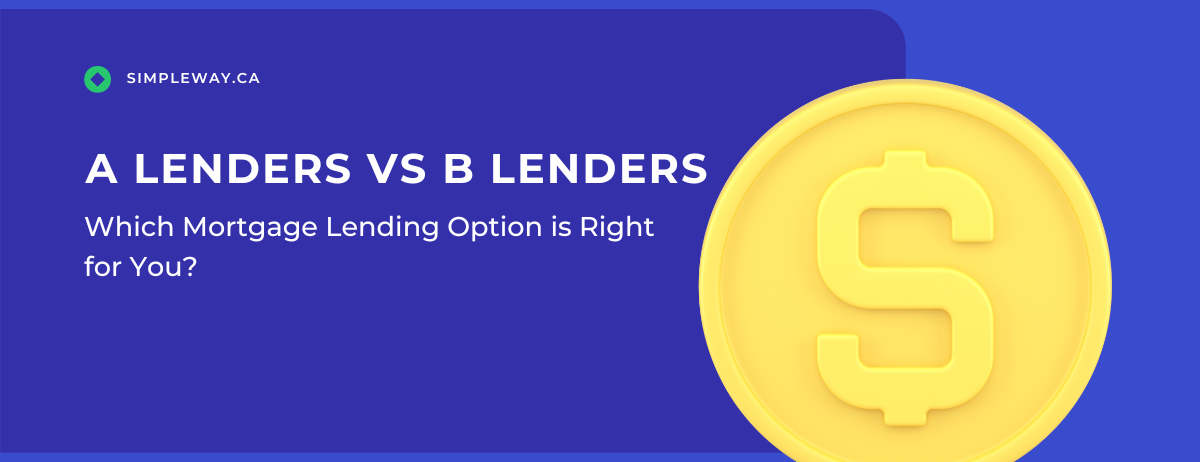
5 min to readWhich Mortgage Lending Option is Right for You?
Are you in the market for a mortgage but unsure whether to go with a traditional bank or a B lender? Making the right choice can save you money and offer greater flexibility. In this article, we’ll explore the differences between B lenders and traditional banks to help you determine which mortgage lending option is right for you.
Traditional banks have always been the go-to option for homebuyers seeking a mortgage. They are known for their stability, wide range of products, and competitive interest rates. On the other hand, B lenders, also known as alternative lenders, cater to borrowers who may not meet the strict criteria of traditional banks. They offer more lenient approval processes and are better equipped to work with clients who have lower credit scores or unique financial situations.
While traditional banks may be appropriate for borrowers with excellent credit and steady income, B lenders can be a lifeline for those who may not qualify for a mortgage with a traditional bank. Understanding the pros and cons of each option can help you make an informed decision about the best fit for your specific circumstances.
So, which mortgage lending option is right for you? Let’s dive in and find out.
Understanding B Lenders and Traditional Banks
When it comes to obtaining a mortgage, there are two primary options to consider: traditional banks and B lenders. Traditional banks have long been the preferred choice for many homebuyers due to their stability, extensive product offerings, and competitive interest rates. B lenders, on the other hand, cater to borrowers who may not meet the stringent criteria set by traditional banks. These alternative lenders provide more lenient approval processes and are better equipped to work with clients who have lower credit scores or unique financial situations.
While traditional banks are ideal for borrowers with excellent credit and stable income, B lenders can be a lifeline for those who may not qualify for a mortgage through a traditional bank. Understanding the pros and cons of each option is crucial in making an informed decision about the best fit for your specific circumstances.
Pros and Cons of B Lenders
B lenders offer several advantages that make them an attractive option for certain borrowers. One of the most significant advantages is their flexibility when it comes to credit scores. Unlike traditional banks that typically require a high credit score, B lenders are more willing to work with borrowers who have less-than-perfect credit. This can be a game-changer for individuals who have experienced financial setbacks or are self-employed and have difficulty providing traditional income documentation.
Another advantage of B lenders is their ability to provide financing for unique properties or situations that may not meet the strict criteria of traditional banks. Whether you’re purchasing a non-standard property such as a rural home or a fixer-upper, or you have a complex financial situation, B lenders have the expertise and willingness to find creative solutions to help you secure a mortgage.
However, there are a few downsides to consider when choosing a B lender. One of the most significant drawbacks is the higher interest rates compared to traditional banks. Since B lenders take on higher-risk borrowers, they offset this risk by charging higher interest rates. This means that over the life of your mortgage, you may end up paying more in interest compared to what you would pay with a traditional bank.
In addition, B lenders may also have stricter mortgage terms and conditions. While they may be more lenient when it comes to credit scores and income documentation, they often have shorter mortgage terms and require larger down payments. These factors can impact your monthly payments and overall affordability.
Pros and Cons of Traditional Banks
Traditional banks have long been the gold standard for mortgage lending due to their stability and extensive range of products. One of the primary advantages of traditional banks is their competitive interest rates. Since they have access to a large pool of funds, they can offer lower interest rates compared to B lenders. This can result in significant savings over the life of your mortgage.
Another advantage of traditional banks is their wide range of mortgage products and options. Whether you’re looking for a fixed-rate mortgage, an adjustable-rate mortgage, or a government-insured mortgage, traditional banks have a variety of options to suit your needs. They often offer more flexibility when it comes to mortgage terms, allowing you to choose the repayment period that works best for your financial situation.
However, traditional banks also have some drawbacks to consider. One of the main disadvantages is their strict lending criteria. They typically require a high credit score, stable income, and a low debt-to-income ratio. If you don’t meet these criteria, your chances of getting approved for a mortgage may be slim. This can be a significant hurdle for borrowers who have experienced financial setbacks or have unique financial circumstances.
Another potential downside of traditional banks is their lengthy and sometimes complex loan application process. From gathering all the necessary documentation to undergoing a thorough underwriting process, securing a mortgage through a traditional bank can be time-consuming and require a great deal of paperwork. This can be a source of frustration for borrowers who are looking for a streamlined and efficient process.
Factors to Consider When Choosing a Mortgage Lending Option
When deciding between a B lender and a traditional bank for your mortgage, several factors should be taken into consideration. These factors can help you determine which option is best suited to your specific circumstances and financial goals.
Credit Score and Mortgage Approval
Your credit score plays a significant role in determining your eligibility for a mortgage. If you have a high credit score, a traditional bank may be the better option as they typically offer lower interest rates and more favorable terms. However, if your credit score is less than stellar, a B lender may be more willing to work with you and provide the financing you need.
Interest Rates and Mortgage Terms
Interest rates are a crucial consideration when choosing a mortgage lender. Traditional banks often offer lower interest rates, which can result in long-term savings. However, if your credit score is not ideal or you have unique financial circumstances, B lenders may be your only option. In this case, it’s essential to carefully evaluate the interest rates and terms offered by B lenders to ensure they are reasonable and within your budget.
Loan Application Process and Requirements
The loan application process and requirements can vary significantly between B lenders and traditional banks. Traditional banks typically have more stringent requirements and a lengthier application process. If you’re looking for a more streamlined and efficient experience, B lenders may be the better choice. However, it’s important to ensure that the B lender you choose has reasonable application requirements and processes to avoid potential complications down the line.
Working with a Mortgage Broker
When navigating the mortgage lending landscape, working with a mortgage broker can be highly beneficial. Mortgage brokers have access to a wide range of lenders, including both B lenders and traditional banks. They can help you find the best mortgage options based on your specific needs and negotiate favorable terms on your behalf. A mortgage broker can also provide valuable guidance and support throughout the entire mortgage process, making it easier to choose the right option for your unique circumstances.
Credit Score and Mortgage Approval
To further illustrate the differences between B lenders and traditional banks, let’s explore a few real-life case studies.
Case Study 1: Sarah’s Unique Financial Situation
Sarah is a self-employed individual with fluctuating income. She recently went through a divorce, which impacted her credit score. Sarah approached a traditional bank for a mortgage but was denied due to her lower credit score and self-employed status. However, she found a B lender willing to work with her and provide the financing she needed. While Sarah had to accept a higher interest rate and shorter mortgage term, she was able to purchase her dream home and improve her financial situation over time.
Case Study 2: John’s Rural Property
John is looking to purchase a rural property with a large plot of land. He approached several traditional banks, but they were unwilling to finance the property due to its unique location and non-standard features. However, John found a B lender specialized in financing rural properties. The B lender was able to provide the necessary financing, albeit at a slightly higher interest rate. John was thrilled to secure the mortgage and turn his dream of owning a rural property into a reality.
Interest Rates and Mortgage Terms
Choosing between a B lender and a traditional bank for your mortgage is a decision that requires careful consideration. Traditional banks offer stability, competitive interest rates, and a wide range of mortgage products. However, they have strict lending criteria and a lengthy application process. B lenders, on the other hand, provide more flexibility, especially for borrowers with lower credit scores or unique financial situations. While B lenders may charge higher interest rates and have stricter mortgage terms, they can be a lifeline for individuals who don’t qualify for a mortgage through a traditional bank.
When making your decision, it’s important to evaluate your specific circumstances, credit score, and financial goals. Consider working with a mortgage broker who can provide expert guidance and help you navigate the mortgage lending landscape. By carefully weighing the pros and cons of each option, you can make an informed choice that aligns with your needs and sets you up for financial success in the long run.
Working with a Mortgage Broker
Interest rates and mortgage terms play a significant role in determining the affordability of a mortgage. Traditional banks typically offer lower interest rates compared to B lenders. This is because traditional banks have a lower cost of funds and can leverage their size and market presence to negotiate better rates. However, these lower rates are often reserved for borrowers with excellent credit and a stable financial history.
B lenders, on the other hand, tend to offer higher interest rates to compensate for the higher risk they take on when lending to borrowers who may not meet the strict criteria of traditional banks. While these rates may be higher, they can still be competitive compared to other borrowing options, such as credit cards or personal loans.
In terms of mortgage terms, traditional banks usually offer a wider range of options, including fixed-rate and adjustable-rate mortgages with various term lengths. B lenders, on the other hand, may have more limited options and may focus on shorter-term mortgages, such as one or two-year terms. It’s important to consider your long-term financial goals and determine which mortgage terms align with your plans.
Case Studies: Real-Life Examples of B Lenders vs. Traditional Banks
The loan application process and requirements can vary significantly between traditional banks and B lenders. Traditional banks have stricter criteria for mortgage approval. They typically require a higher credit score, a stable employment history, and a lower debt-to-income ratio. They may also request extensive documentation, such as income verification, tax returns, and bank statements.
B lenders, on the other hand, have more lenient approval processes and are more willing to work with borrowers who may not meet the strict criteria of traditional banks. They take into consideration factors beyond credit scores and are often more flexible when assessing a borrower’s financial situation. B lenders may still require documentation and proof of income, but they may be more willing to consider alternative sources of income or accept borrowers with a higher debt-to-income ratio.
When deciding between a traditional bank and a B lender, it’s important to assess your own financial situation and determine whether you meet the criteria set by traditional banks. If you have a lower credit score or unique financial circumstances that may not meet traditional bank requirements, working with a B lender may be a more viable option.
Conclusion: Making the Right Choice for Your Mortgage Lending Needs
Navigating the mortgage market can be overwhelming, especially when considering the different options available. Working with a mortgage broker can help simplify the process and provide valuable insights into the offerings of both traditional banks and B lenders.
A mortgage broker acts as an intermediary between borrowers and lenders, helping borrowers find the best mortgage options based on their specific needs and financial situation. Mortgage brokers have access to a wide network of lenders, including both traditional banks and B lenders, allowing them to offer a comprehensive range of mortgage options.
Mortgage brokers can help you understand the differences between traditional banks and B lenders, explain the nuances of interest rates and mortgage terms, and guide you through the loan application process. They can assess your financial situation, match you with suitable lenders, and negotiate on your behalf to secure the best possible mortgage terms and rates.



